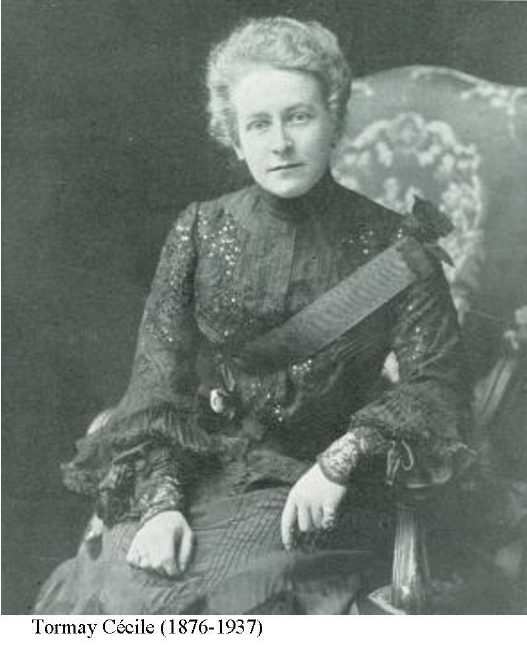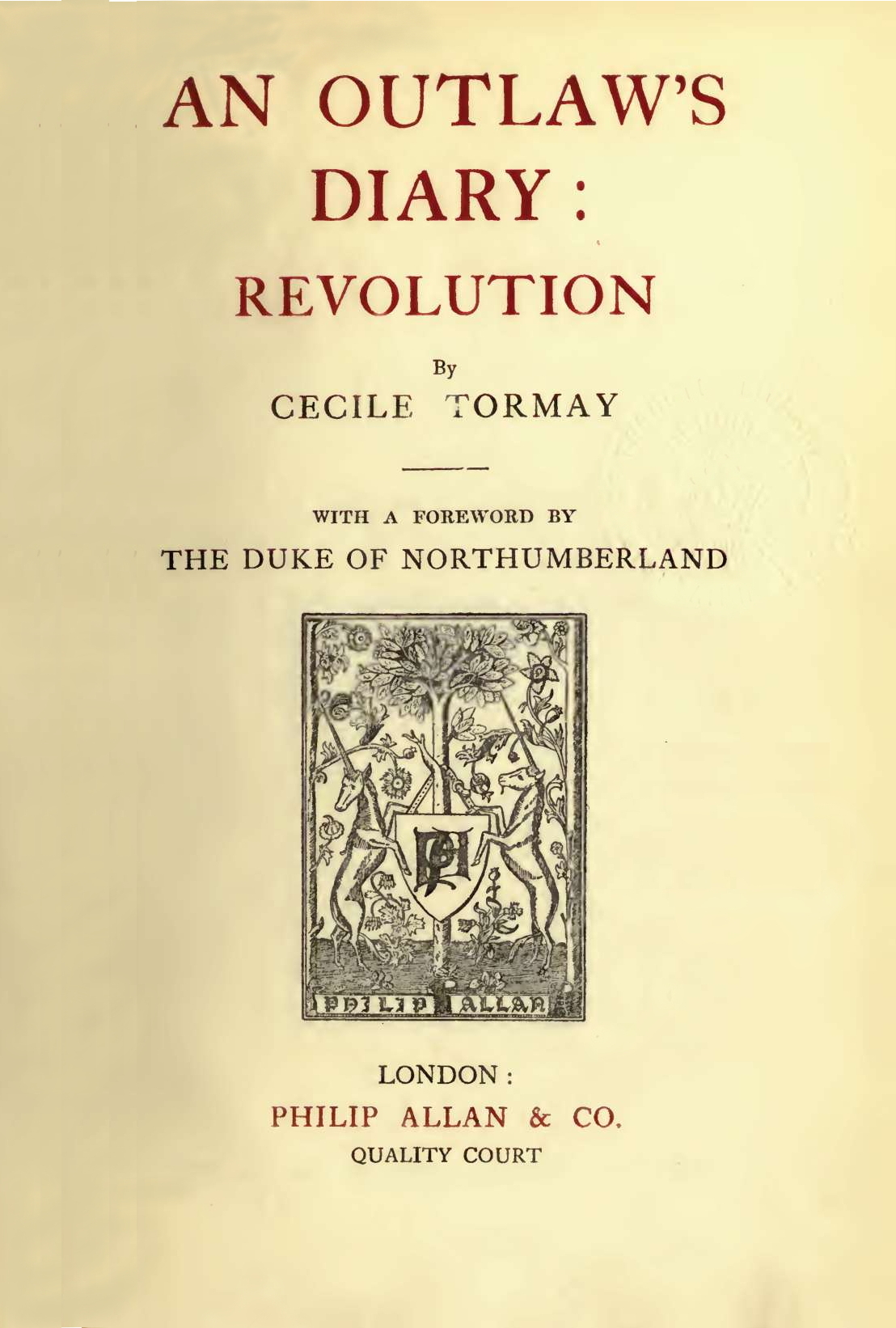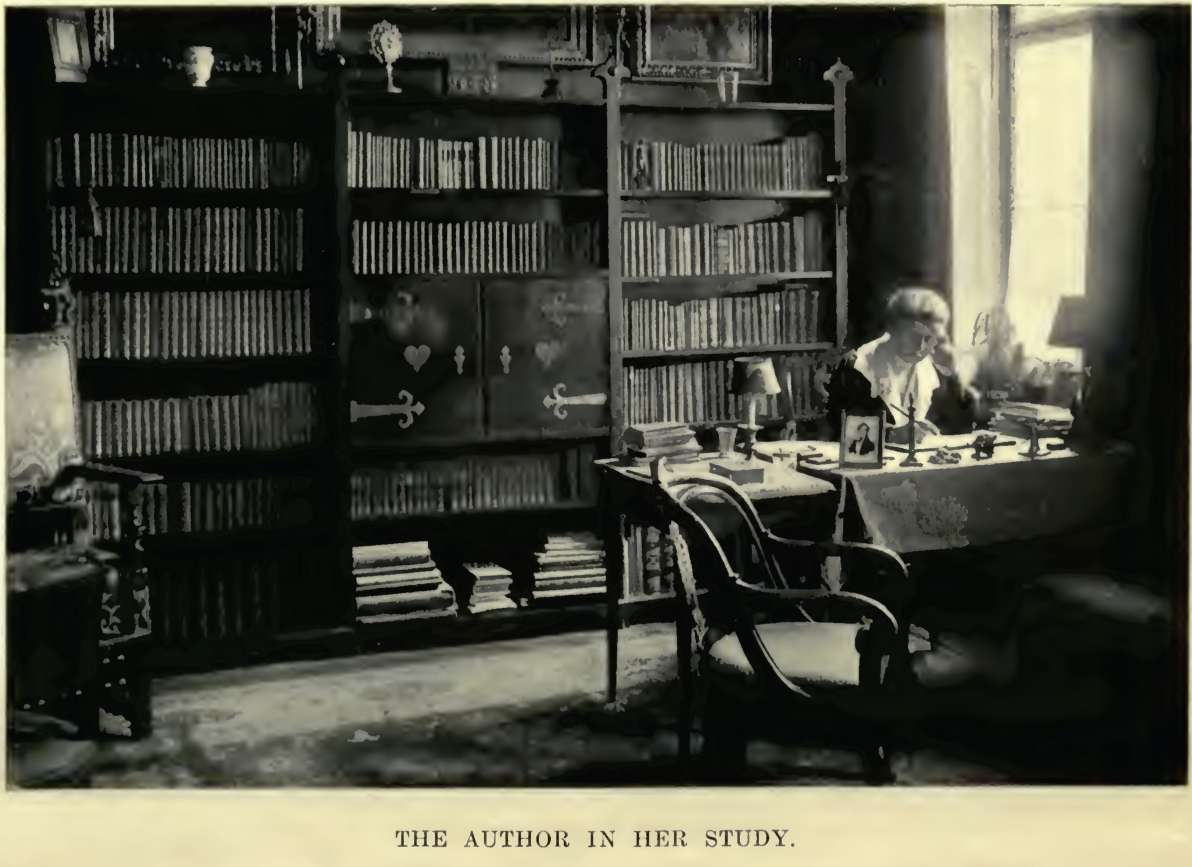PREFACE
It was fate that dubbed this book An Outlaw's Diary, for it was itself outlawed at a time when threat of death was hanging over every voice that gave expression to the sufferings of Hungary. It was in hiding constantly, fleeing from its parental roof to lonely castles, to provincial villas, to rustic hovels. It was in hiding in fragments, between the pages of books, under the eaves of strange houses, up chimneys, in the recesses of cellars, behind furniture, buried in the ground. The hands of searching detectives, the boots of Red soldiers, have passed over it. It has escaped miraculously, to stand as a memento when the graves of the victims it describes have fallen in, when grass has grown over the pits of its gallows, when the writings in blood and bullets have disappeared from the walls of its torture chambers.


BY THE SAME AUTHOR
Crown 8vo. 6s. net. each
THE OLD HOUSE : A Novel
STONECROP : A Novel
Published by
PHILIP ALLAN & CO.
First published in 1923
PRINTED IN GREAT BRITAIN BY W. JOLLY AND SONS, LTD., ABERDEEN.

LIST OF ILLUSTRATION
| The Author in her Study | frontispiece | |
| Revolutionary Soldiers | page | 8 |
| Paul Keri and Victor Heltai | " | 10 |
| Eugene Landler | " | 12 |
| Count Stephen Tisza | " | 20 |
| Count Michael Károlyi | " | 26 |
| King Charles | " | 36 |
| Count Károlyi and his Entourage | " | 50 |
| The House of Parliament | " | 58 |
| "Károlyi Stood on the Steps" | " | 60 |
| Soldiers Swearing Allegiance to the National Council | " | 62 |
| Joseph Pogány | " | 70 |
| Countess Károlyi | " | 72 |
| Fiume | " | 78 |
| "The Tragedy of Every Ruined Home" | " | 86 |
| "On the Roofs of the Incoming Trains" | " | 96 |
| Heltai's Sailors | " | 120 |
| The Crown Prince | " | 122 |
| "On all the Roads...Homeless People are in Flight" | " | 122 |
| Queen Zita | " | 128 |
| "A Tiny Szekler Village" | " | 132 |
| John Hock | " | 138 |
| Sigmund Kunfi | " | 140 |
| Béla Kún | " | 160 |
| The Hungarian Crown | " | 162 |
| A Communist Orator | " | 176 |
| The Valley of the Garam | " | 186 |
| William Böhm | " | 196 |
| Béla Kún Addressing the Crowd | " | 214 |
| "There were Processions Everywhere" | " | 258 |
| The Royal Castle, Buda | " | 260 |
| Count Károlyi Distributing his Lands | " | 270 |
CONTENT
| Chapter | Page |
| I | 1 |
| II | 19 |
| III | 34 |
| IV | 55 |
| V | 69 |
| VI | 85 |
| VII | 101 |
| VIII | 119 |
| IX | 135 |
| X | 153 |
| XI | 171 |
| XII | 189 |
| XIII | 208 |
| XIV | 225 |
| XV | 239 |
| XVI | 256 |
| XVII | 274 |
TO
A GENTLE VICTIM
OF THE REVOLUTION
MY UNFORGETTABLE MOTHER
I DEDICATE THIS
BOOK
PREFACE
It was fate that dubbed this book An Outlaws Diary, for it was itself outlawed at a time when threat of death was hanging over every voice that gave expression to the sufferings of Hungary. It was in hiding constantly, fleeing from its parental roof to lonely castles, to provincial villas, to rustic hovels. It was in hiding in fragments, between the pages of books, under the eaves of strange houses, up chimneys, in the recesses of cellars, behind furniture, buried in the ground. The hands of searching detectives, the boots of Red soldiers, have passed over it. It has escaped miraculously, to stand as a memento when the graves of the victims it describes have fallen in, when grass has grown over the pits of its gallows, when the writings in blood and bullets have disappeared from the walls of its torture chambers.
And now that I am able to send the book forth in print, I am constrained to omit many facts and many details which as yet cannot stand the light of day, because they are the secrets of living men. The time will come when that which is dumb to-day will be at liberty to raise its voice. And as some time has now passed since I recorded, from day to day, these events, much that was obscure and incomprehensible has been cleared up. Yet I will leave the pages unrevised, I will leave the pulsations of those hours untouched. If I have been in the wrong, I pray the reader's indulgence. My very errors will mirror the errors of those days.
Here is no attempt to write the history of a revolution, nor is this the diary of a witness of political events. My desire is only that my book may give voice to those human phases which historians of the future will be unable to describe—simply because they are known only to those who have lived through them. It shall speak of those things which were unknown to the foreign inspirers of the revolution, because to them everything that was truly Hungarian was incomprehensible.
May there survive in my book that which perishes with us : the honour of a most unfortunate generation of a people that has been sentenced to death. May those who come after us see what tortures our oppressed and humiliated race suffered silently during the year of its trial. May An Outlaw's Diary be the diary of our sufferings. When I wrote it my desire was to meet in its pages those who were my brethren in common pain; and through it I would remain in communion with them even to the time which neither they nor I will ever see—the coming of the new Hungarian spring.
CECILE TORMAY.
BUDAPEST,
Christmas, 1920.
FOREWORD
The writer of this book tells us that " here is no attempt to write the history of a revolution, nor is this the diary of a witness of political events. " Nevertheless the fact remains that it contains much more than the personal experiences of an actor in one of the greatest tragedies that has occurred in recent history. If it were only that, its value would still be very great, for it is so vivid and dramatic a human document, and yet its style is so simple and so completely devoid of all " frills " or straining after effect, that it will appeal as much to those who like good literature and a moving tale for their own sakes, as to those who desire to understand a chapter of history about which little is known, but which yet throws a flood of light upon the great world movements of to-day.
To those, who are interested in that international revolutionary movement which, in one form or another, is threatening every civilized state to-day, this book will be invaluable. The course of events which led up to the revolution in Hungary was precisely similar to the course of events in Russia. In both cases there was a more or less open radical, socialistic, and pacifist movement working in conjunction with a hidden subversive movement. In Hungary the latter movement is described as " a pseudo-scientific organization of the Freemasons, the International Freethinkers' Branch of Hungarian Higher Schools, and the Circle of Galilee with its almost exclusively Jewish membership. "
In both cases the way for revolution was prepared by an insidious propaganda in the workshops and in the Army and Navy. In both cases the revolution was not the result of a spontaneous outburst of popular feeling but of a sinister conspiracy using the confusion and discouragement of a military disaster for its own ends. In both cases the first step towards the complete overthrow of Church and State was the erection of a bourgeois radical and socialist republic whose aim was to disintegrate and demoralise as a preliminary to the coup d'état which ushered in " the dictatorship of the Proletariat. " Russia had her Kerensky, Hungary her Károlyi.
This book deals with Hungary's agony from the standpoint of one who experienced every one of its phases; it does not deal with Hungary's resurrection from the grave of Bolshevism, and it is here that the parallel with Russia ceases. The heart of Hungary was sound; the corruption, demoralisation and inertia which have made Russia the plague-spot of humanity had not so deeply permeated the national life of Hungary. The race had too much vigour, too great a regard for its religion, its history, its traditions and its liberty to submit for long to that soul-destroying tyranny. And yet—and here is a lesson for the countries of Western Europe—this nation, which, owing to its traditions and the character and pursuits of its people would have seemed less disposed than any other to submit to Communism, did for a time succumb to the despotism of a few criminal fanatics, a gang of mental and moral perverts. And the disaster was due not so much to the strength of the subversive influences as to the weakness and cowardice of the authorities in Church and State and in Society at large.
In a great industrial country like Great Britain there is far more favourable ground than there was in Hungary for the production of antisocial philosophies and the manufacture of revolutionaries; the danger from insidious propaganda, from the failure of Government to govern, is no less but rather more than it was in Hungary. This book shows how appalling are the consequences of even a temporary overthrow of those bulwarks of civilisation, law, order and religion, and that mankind in the 20th Century is capable of reverting in a moment to the barbarism and anarchy of the Dark Ages. Russia, Italy, Hungary and Ireland have all in the past few years told the same tale. One of the greatest empires of the world now presents the picture of a society enduring a living death; Hungary and Italy have saved themselves by their exertions and perhaps Europe by their example. Ireland's fate is trembling in the balance, but the corruption of a whole population, the systematic training of the youth of a country to exalt rebellion into a science and murder into a religion, can only have one result. If the cancer has been checked in some quarters, if the gangrene has been amputated here and there, the poison is still working through all the European body politic, not only in those outrageous forms which naturally arouse opposition in all decent and educated minds, but in those subtle forms which disguise themselves under the cloak of a spurious Christianity, a zeal for humanity, the brotherhood of man, and the internationalism of Labour. The open and the hidden agitations subsist side by side and each plays into the other's hands. The " Red " International of Moscow, the " Yellow " International of Amsterdam, the various shades of Socialism and Syndicalism, are all parts of one great subversive Movement though their adherents are not all aware of it, and the strings are pulled by the Secret Societies which during the past century have been behind every revolution in Europe.
And, as this book reminds us, the only means of counteracting the danger is not by surrender or compromise, not by seeking new creeds and theories but in adherence to old ones, not by nursing illusions but by facing facts, by courage, by a steadfast regard for principles, by the faith of authority in its mission, by " strengthening the things which remain and are ready to die. "
NORTHUMBERLAND.

